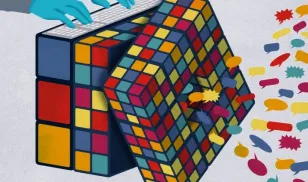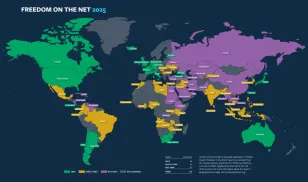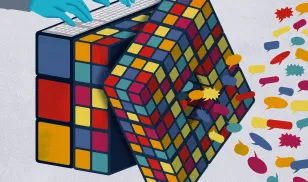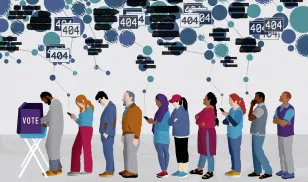
Freedom on the Net is Freedom House’s annual survey and analysis of internet freedom around the world. This cutting-edge project consists of ground-breaking research and analysis, fact-based advocacy, and on-the-ground capacity building. The hallmark of our analysis is the annual Freedom on the Net report. It features a ranked, country-by-country assessment of online freedom, a global overview of the latest developments, as well as in depth country reports.

See the Latest Edition
The immediate future of internet freedom will depend on how governments deploy incentives for and controls over the next wave of technological innovation. Explore Freedom on the Net 2025: An Uncertain Future for the Global Internet
Resources

Explore the Map
Explore internet freedom around the world through the Freedom on the Net 2025 interactive map.

Research Methodology
Each Freedom on the Net country assessment includes a detailed narrative report and numerical score, based on methodology developed in consultation with international experts.

Download Data
Interested in downloading Freedom on the Net report data? Please email [email protected] with "FOTN Data Request" in the subject line and our team will assist you.
About Freedom on the Net
Freedom on the Net is Freedom House’s annual survey and analysis of internet freedom around the world. This cutting-edge project consists of ground-breaking research and analysis, fact-based advocacy, and on-the-ground capacity building.
The hallmark of our analysis is the annual Freedom on the Net report. It features a ranked, country-by-country assessment of online freedom, a global overview of the latest developments, as well as in depth country reports.
The key trends and emerging threats highlighted in reports are then used in national and international advocacy campaigns by Freedom House. Our findings are also used by activists worldwide in working for change, by international development agencies in designing programs and determining aid recipients, by tech companies for business decisions and risk assessments, by journalists who cover human rights online, by governments and policymakers, and by scholars and experts.
The project builds the capacity of its network of researchers—in-country activists, civil society groups, academics, journalists, and tech and legal experts chosen for their work and expertise—to serve as internet freedom defenders around the world.

Key Internet Controls
To track the different ways in which governments seek to dominate the digital sphere, Freedom House monitors their application of nine Key Internet Controls. The resulting data reveal trends in the expansion and diversification of these constraints on internet freedom.
Why Measure Internet Freedom?
As we increasingly rely on the internet, it is important that the rights we enjoy offline are also protected online. The freedoms of expression, access to information, privacy, and association and assembly enshrined in international covenants are fundamental to the upholding of liberal democratic values. Even in closed societies, digital technology can penetrate longstanding political and media restrictions, carving out a limited space for freedom online.
Digital technology is a tool like any other; it can be used by both evaders and enforcers of government censorship and surveillance. Authoritarians, too, have understood the internet’s potential for individual and community empowerment and over the past few years have worked to build a new barrier of fear in the online domain.
Given this emerging battleground for human rights, Freedom on the Net measures internet freedom in order to identify threats to rights and opportunities for positive change. Our reports seek to inform the wider community of activists, journalists, policymakers, entrepreneurs, and ordinary citizens in order to advocate for an internet characterized by freedom, openness, safety, and security for all.
What Do We Measure?
Freedom on the Net measures the subtle and not-so-subtle ways that governments and non-state actors around the world restrict our rights online. Each country assessment includes a detailed narrative report and numerical score, based on methodology developed in consultation with international experts. This methodology includes three categories:
- Obstacles to Access details infrastructural, economic, and political barriers to access; government decisions to shut off connectivity or block specific applications or technologies; legal, regulatory, and ownership control over internet service providers; and independence of regulatory bodies;
- Limits on Content analyzes legal regulations on content; technical filtering and blocking of websites; other forms of censorship and self-censorship; the vibrancy and diversity of the online environment; and the use of digital tools for civic mobilization;
- Violations of User Rights tackles legal protections and restrictions on free expression; surveillance and privacy; and legal and extralegal repercussions for online speech and activities, such as imprisonment, extralegal harassment and physical attacks, or cyberattacks.
Which Countries Do We Study?
Freedom on the Net has expanded from covering 15 countries in our 2009 pilot edition to 72 in the latest report. Countries are selected on the basis of the size of their internet population, their regional or global positioning, as well as the unique quality of their restrictions or protections on the internet. The countries selected for the report covers 87 percent of the global internet population, ensuring the project analyzes the vast majority of users.
Report Authors
Our Impact
Freedom on the Net is the most widely utilized resource worldwide for activists, government officials, journalists, companies, and international organizations aiming to understand the emerging threats and opportunities in the internet freedom landscape globally, as well as policies and developments in individual countries.
The project shapes global discussions on internet freedom through its widespread media coverage. The report receives hundreds of media mentions in over 72 countries each year, including in The New Yorker, the Washington Post, The Economist, and the Guardian. Policymakers also turn to Freedom on the Net to help inform various global issues as they unfold; it has been cited by senior government officials such as the President of Estonia, Sweden’s Minister of Foreign Affairs, the Canadian Foreign Affairs Minister, and U.S. Congressman Ed Royce.
Activists and civil society organizations use Freedom on the Net extensively to draw attention to their government’s policies and to call for positive change. In Nigeria, Freedom on the Net served as the foundation for a Digital Rights and Freedom Bill drafted by civil society in 2014. NGOs in Pakistan used the project for advocacy at the Human Rights Council to press their government on their internet freedom record and as part of a shadow submission on digital rights during the country’s Universal Periodic Review in 2012. The report is frequently cited at high-profile international events such as the Internet Governance Forum, UN sessions, and Freedom Online Coalition meetings.
Representatives from the private sector and government agencies also turn to our reports. Freedom on the Net has been used by tech companies large and small to perform market research and due diligence, as well as to understand how their practices can promote, preserve, or undermine internet freedom. U.S. foreign aid agencies such as the Millennium Challenge Corporation, a poverty reduction mechanism conditional on a country’s upholding of human rights, utilize Freedom on the Net’s research findings as an indicator to determine aid eligibility for prospective countries.
Our Team
Freedom on the Net is a collaborative effort between a small team of Freedom House staff and an extensive network of local researchers and advisors in 70 countries. Our in-country researchers have diverse backgrounds—activism, civil society, academia, journalism, law, and tech— and track developments from their country of expertise. In the most repressive environments, Freedom House takes care to ensure researchers’ anonymity or, in exceptional cases, works with foreign nationals living outside their home country.
Our Donors
Current or past funders include:
Amazon
Dutch Ministry of Foreign Affairs
The Dutch Postcode Lottery
German Federal Foreign Office
Golden Frog
Google
The Hurford Foundation
Internet Society
Internet Society Foundation
The Lilly Endowment
Meta
The New York Community Trust
Proton
Schloss Family Foundation
Twitter
United Nations Democracy Fund (UNDEF)
U.S. Agency for International Development (USAID)
U.S. State Department’s Bureau of Human Rights and Labor (DRL)
Verizon
Yahoo
Recent Editions
- Past Editions
- Freedom on the Net 2024: The Struggle for Trust Online
- Freedom on the Net 2023: The Repressive Power of Artificial Intelligence
- Freedom on the Net 2022: Countering an Authoritarian Overhaul of the Internet
- Freedom on the Net 2021: The Global Drive to Control Big Tech
- Freedom on the Net 2020: The Pandemic's Digital Shadow
- Freedom on the Net 2019: The Crisis of Social Media
- Freedom on the Net 2018: The Rise of Digital Authoritarianism
- Freedom on the Net 2017: Manipulating Social Media to Undermine Democracy
- Freedom on the Net 2016: Silencing the Messenger: Communication Apps Under Pressure
- Freedom on the Net 2015: Privatizing Censorship, Eroding Privacy
- Freedom on the Net 2014
- Freedom on the Net 2013
- Freedom on the Net 2012
- Freedom on the Net 2011
- Freedom on the Net 2009

Sign up to receive the Freedom House weekly newsletter.









